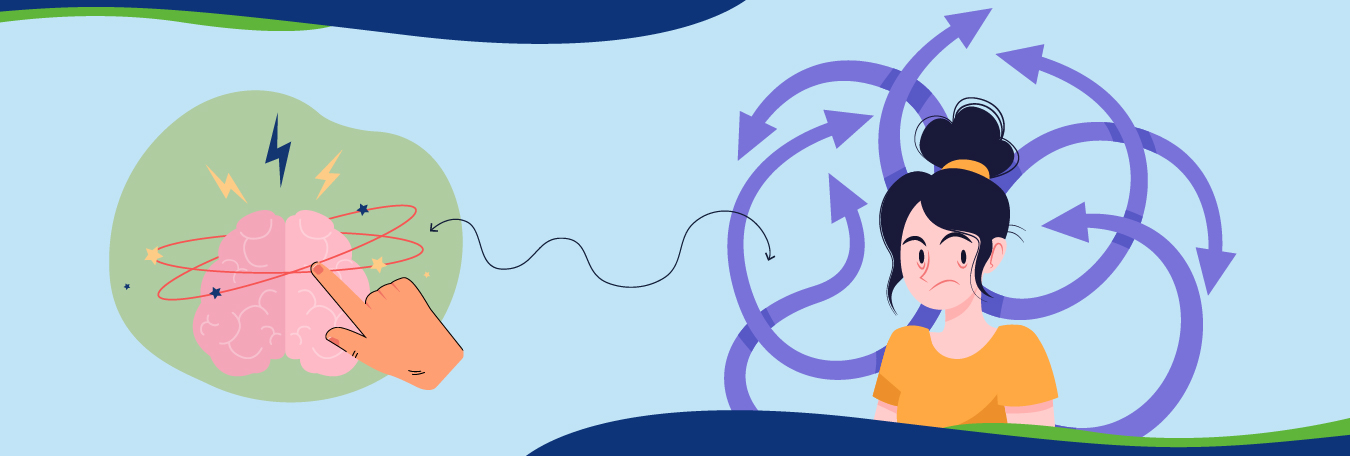Some people experience life as a storm of emotions, where they react more forcefully to things that happen normally.
For them, life is a series of emotional storms. Joy can turn to worry for them in no time, and a small setback feels like a huge distress.
Psychologists call this neuroticism, one of the Big Five personality traits that describe human temperament. In the context of the Big 5, neuroticism is something like low emotional stability or negative emotionality.
Below, we will know more about the details of what neuroticism is, what that means, and how it is related to your mental health, how it can affect the personality and behavior of a person. How can it show up in everyday life and disrupt the daily functioning of life? Furthermore, if it exceeds, how can it be cured through professional help?
What Is Neuroticism?
In modern psychology, neuroticism refers to one’s tendency towards emotional instability and sensitivity to stress.
It is one of the Five-Factor Model (FFM) traits, which are openness, conscientiousness, extraversion, agreeableness, and emotional stability.
But, far from flaws, it is a part of the multiple traits of human personality. It shows how forcefully and normally a person experiences negative emotions, like fear, guilt, sadness, and self-doubt.
There is high neuroticism and low neuroticism. People with high neuroticism show low tolerance towards stress and a greater tendency to interpret everyday situations as threatening and overwhelming.
But high neuroticism does not mean mental illness, though it can increase vulnerability to conditions like anxiety and depression. Instead, it is not about reactivity, which means how easily emotions can be triggered and how long they linger.
However, neuroticism is not like being neurotic in a Freudian sense.
It is a general term for being anxious or dramatic.

Understanding neuroticism helps explain emotional sensitivity and how we can transform it into strength.
Do you Know:
What Is Derealization/Depersonalization: Causes, Symptoms, and Treatment
Neuroticism in the Big Five Model
The Big Five model is a famous framework in psychology that categorizes human personality into five broad traits: Openness, Conscientiousness, Extraversion, Agreeableness, and Neuroticism. These traits are categorized in the acronym OCEAN to help remember them.
The Big Five Model positions neuroticism as a fundamental dimension of personality, after it has been developed through decades of research by psychologists such as Lewis Goldberg.
While extraversion traits reflect how we engage with the world, neuroticism describes how we experience it internally.
Here you can see the difference between low neuroticism and high neuroticism.
High Neuroticism:
- They experience a high range of negative emotions, anxiety, anger, depression, worry, and fear.
- They can have difficulty coping with stress and overthinking situations
- They are more likely to interpret normal situations as threatening.
- They may experience mood swings and emotional instability.
- They may have already experienced or are at risk of certain mental health disorders.
Low Neuroticism
- They are calmer, confident, and emotionally stable.
- They are more resilient to stress and less likely to feel tense or rattled.
- Low neuroticism is less likely to be moody, anxious, or depressed.
- They often have a strong coping mechanism and are not easily upset.
Neither low nor high is inherently good or bad. Both states come with their own strengths and weaknesses.
Get To Know About: Mental Health Tips For Physical And Emotional Well-Being
Neuroticism as Self-Knowledge
Neuroticism is not something bad; rather, neuroticism is a personality trait. It is linked to self-knowledge as it involves heightened self-awareness, particularly when concerned about negative emotions and potential threats.
This increased self-awareness can lead to greater emotional depth, more realistic expectations, and a drive toward self-regulation. But on the other hand, it contributes to anxiety, self-criticism, and distress about oneself.
But modern psychology encourages acceptance over elimination. Rather than fighting neuroticism, it is better to understand and know when emotions inform us about danger and when they mislead us.
This is associated with Carl Rogers’ humanistic psychology that emphasizes growth through self-awareness and reality.
If neuroticism heightens pain, it also deepens experience. The same sensitivity that fuels worry can also enrich connection, creativity, and kindness.

The Core Characteristics of Neuroticism
Psychology divides neuroticism into many facets that shape emotional patterns
Like:
- Anxiety, that is a frequent feeling of nervousness or fear.
- Anger and irritability, which lead to reacting strongly to perceived injustice or frustration.
- Depression, that is, sadness, hopelessness, or self-blame.
- Self-Consciousness, about how other people think about you.
- Impulsiveness, this can be like anxiety, but with difficulty in controlling emotional reactions.
- Vulnerability to Stress, which means feeling overwhelmed easily in pressure situations.
These characteristics interact with the environment and life experiences. For example, someone with high self-consciousness may be successful in a profession but struggle to face public criticism.
Want a best treatment option for such characteristics? Read More: What Is Emotion-Focused Coping?
What are the psychological Causes and Influences behind neuroticism?
These are the factors behind neuroticism.
1. Genetic and Biological Factors
Research shows that neuroticism is partly inheritable, which means it is influenced by genes that affect brain chemistry, especially serotonin and dopamine regulation.
Neuroimaging studies reveal heightened activity in the amygdala, the brain’s fear center, which may show stronger emotional responses to any situation.
2. Environmental and Developmental Factors
Early life experiences, like no proper care-giving, trauma, or overly critical environments, can heighten emotional sensitivity.
Over time, these experiences shape emotion regulation strategies that support the neurotic pattern.
3. Connection between Personality and Culture
Cultural norms also shape how neuroticism expresses itself. In collectivist cultures, emotional limitations may reduce visible neurotic behaviors, while in individualistic cultures, open freedom of expression may amplify them.
Thus, neuroticism is not fixed; it is formed within the context.
How Does Neuroticism Impact Daily Life?
Relationships
High neuroticism can lead to interpersonal tension, overthinking, worrying about rejection, or accepting blame. The same sensitivity can make someone deeply caring and open to others’ needs.
Work and Performance
Emotionally reactive people may find it hard to handle pressure because they worry about making mistakes or about others criticizing their work. However, these same people are very careful and pay close attention to every detail because they fear criticism.
They are good at looking ahead and figuring out where problems might show up before they even happen. This skill makes them valuable in jobs that require being super careful, such as reviewing records or caring for others.
Health and Well-Being
Chronic stress, like anxiety or depression from neurotic tendencies, can affect the physical health of a person. It raises your chances of having troubled sleep, insomnia, heart disease, or a weakened immune system.
But there is good news in that, being aware that you tend to worry a lot is the first step. This awareness can help you choose ways to handle stress.
What Is The Positive Side Of Neuroticism?
There are hidden positive aspects of neuroticism along with negative ones. These are:
- Empathy and depth: When you are aware of your own emotions, it enables you to better understand others’ feelings and give care to them.
- Creativity: strong feelings can be used to create meaningful art, music, or stories.
- Vigilance: worrying in a positive sense can make you plan ahead of anything and be prepared for potential problems.
- Motivation for self-improvement: when you want to feel better or solve a problem, it can push you to learn and grow as a person.

In short, when kept in balance, these emotional traits can lead to being more understanding, insightful, and having a strong sense of purpose.
Treatment And Methods To Turn Sensitivity Into Strength
Psychology offers several neuroticism treatment strategies for regulating emotional intensity.
Cognitive Behavioral Therapy (CBT)
Cognitive behavioral therapy (CBT) is a widely used and effective form of psychotherapy that focuses on the connection between thoughts, feelings, and behaviors.
The core idea is that by changing negative or unhelpful thought patterns and behaviors, people can change the way they feel and improve their overall well-being.
Read More on Psychotherapy:
What to Expect from Psychodynamic Psychotherapy
As you noted, CBT helps people to:
- Identify and challenge negative thoughts: CBT helps to develop skills to recognize automatic negative thoughts or cognitive distortions, such as the “I will fail” to yes, I can do it”
- Develop emotional perspective-taking: CBT helps people to re-evaluate situations from a more realistic and balanced perspective. This might involve looking for evidence for and against a thought or considering alternative explanations.
- Change thoughts into more positive and realistic ones: thoughts such as “I am failing” and change this into “I am prepared for it” and “challenges are normal” help to reduce anxiety and promote a more constructive approach to the situation.
Other than CBD helps restructuring cognitive restructuring (changing thoughts), it involves other techniques for behavioral activation (changing behaviors). It is also used to treat other co-occurring conditions like anxiety disorder, depression, obsessive-compulsive disorder (OCD), and post-traumatic stress disorder (PTSD).
Neuroticism, a Sensitivity as a Form of Strength
This is to say, neuroticism is not a weakness; it is a form of emotional intensity that requires skillful management, not suppression.
With the proper understanding of the roots of our emotional reactions, we transform neuroticism from turmoil into emotional intelligence.
Being sensitive to life’s ups and downs is not a flaw; it is a reminder that you feel deeply, care deeply, and have the capacity to grow deeply.
How Can We Help Develop Emotional Regulation Into Positive Ones?
The Inland Empire Behavioral Group knows about your feelings well and can propose a solution that can help you thrive in life with more vigilance and thoughtfulness. We have experienced psychiatrists and therapists who can turn your negative feelings into positive ones by actively listening to you and understanding you. You can have personalized treatment plans that further help you get emotionally better and thrive in life, whether you are dealing with relations, professional environment, or social norms.
Get our help, call us, or email us for more details about our workings or setting up sessions.




